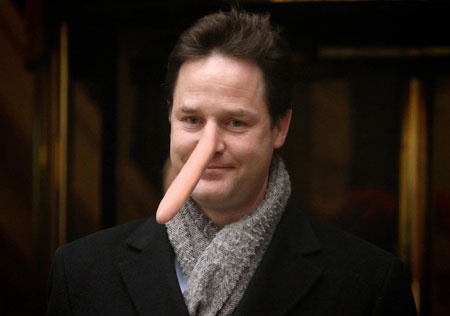
Nick Clegg apologises for tuition fees pledge
“There’s no easy way to say this: we made a pledge, we didn’t stick to it and for that I am sorry. . . When we’re wrong, we hold our hands up. But when we’re right we hold our heads up too. We were right to leave the comfort of opposition to face the realities of Government and I know we are fighting for the right things.”
London bomb plotters launch appeal over ‘flawed’ forensic evidence
Four convicted over 21 July 2005 plot claim evidence that bombs were intended to cause carnage was unreliable
Four of the terrorists convicted for the 21 July 2005 bomb plot will launch an attempt to have their sentences quashed following claims by a former senior government scientist that key forensic evidence used to jail the attackers was flawed.
Evidence from Sean Doyle, the former principal scientist at the Ministry of Defence’s Forensic Explosives Laboratory (FEL) who was involved in the investigation into the explosive devices, is set to be submitted to the court of appeal and the Criminal Cases Review Commission by lawyers for Muktar Said Ibrahim, Yassin Oma and Ramzi Mohammed. They were found guilty and sentenced to life in prison in July 2007 for trying to cause carnage on the London transport system.
Their failed attack came two weeks after four suicide bombers murdered 52 people on London’s transport network on 7 July 2005. Manfo Kwaku Asiedu, who pleaded guilty on the lesser charge of conspiracy to cause an explosion, is also seeking to have his conviction overturned.
Doyle alleges that scientific evidence submitted in the original trial that the bombs were intended to cause carnage was unreliable. Lawyers for the men claim that concerns about that evidence should have been disclosed to the court as it went to the heart of the prosecution case. Failure to do so was an abuse of process that should have caused the proceedings against the defendants to be stayed, they say.
The bombs failed to detonate properly and the terrorists’ defence was that the chapati flour and bleach in their rucksack explosives were deliberately mixed to ensure there was no harm caused. They said the attack was “an elaborate hoax designed to protest against and draw attention to Britain’s role in the attack upon and occupation of Iraq”.
…
The silence of the bees: government refuses to act on pesticide evidence
…
The bee fiasco began in March with the publication of two studies in Science. The first found that bees consuming one pesticide suffered an 85% loss in the number of queens their nests produced, while the second showed a doubling in “disappeared” bees, those that failed to return from food foraging trips. The work was the first to be carried out in realistic, open-air conditions and used levels of neonicotinoids found in fields.
Professor Mickaël Henry, at INRA in Avignon, France, who led the “disappeared” bees study was under no illusion about the implications of his findings: “Under the effects we saw from the pesticides, the population size would decline disastrously, and make them even more sensitive to parasites or a lack of food.” He said current regulation was inadequate.
These high profile studies – and others – prompted the UK’s environment ministry (Defra) to investigate. “It is appropriate to update the process for assessing the risks of pesticides to bees in the light of scientific developments – including the latest research,” it stated.
Now, six months on, it has delivered its verdict: “The recent studies do not justify changing existing regulation.” How can this be? Defra states:
The studies were interesting but they either used neonicotinoids at a higher level than is currently permitted, or the studies weren’t carried out under field conditions. The studies did not show that currently permitted uses of neonicotinoids have serious implications for the health of bee populations.
…